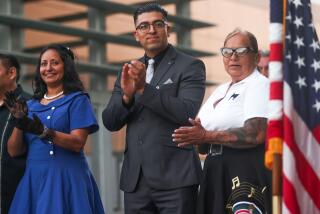Candidates Face Fines for Overdue Financial Reports
- Share via
COMPTON — Nearly a dozen candidates, including the mayor and two incumbent city councilmen, face fines because they did not file the state-required campaign contribution and spending reports that were due two weeks before the April 18 election.
Mayor Walter R. Tucker, who has been forced into a June runoff, filed a late report last week showing that by April 1 he had raised $21,840, with about 75% of it in $500-to $1,000-contributions from developers and firms that do business with the city.
Even City Attorney Tardy
Councilman Robert L. Adams Sr., who was also forced into a June runoff, and Councilman Floyd A. James, who lost his reelection bid, have yet to disclose how they collected and spent their campaign money.
As of Thursday, they had not filed reports, despite warning notices sent April 12 by City Clerk Charles Davis telling those who failed to meet the April 6 filing deadline that they faced fines of at least $10 a day if they did not file by April 17.
The man who is supposed to help assess and collect the fines, City Atty. Wesley Fenderson Jr., faces a fine himself. According to the city clerk, Fenderson, who was reelected, has not yet filed his report. Fenderson’s opponent, Frank Bazadier, also faces a fine because his report was filed late.
Patricia A. Moore, the city’s new councilwoman-elect, did not make the deadline either. Moore, who defeated James, filed her report Thursday accompanied by a letter that said she was late because her campaign treasurer had become ill and had to be hospitalized. Because of that, Davis said he is not including Moore’s name on the list of those who owe fines.
Under the state’s campaign disclosure law, candidates for municipal office must file contribution and spending reports with the city clerk. After a grace period, Davis said, he forwards the names of violators to the city attorney who sends out notices telling the candidates to pay the fines and file the reports.
In the past, Davis said, there have been candidates who still didn’t comply, and he has had to ask Los Angeles County Dist. Atty. Ira Reiner to help the city enforce the law.
Davis said he also sends the names of violators to the state Fair Political Practices Commission (FPPC), which, under the law, can also levy the fines. The minimum fine is $10 a day for every day a candidate is late, but the FPPC can levy fines that run into thousands of dollars, equal to the amount of money a candidate collects, Davis said.
$1,000 Contributors
During the life of a campaign, there are several reporting periods. The April 6 reports covered the period between March 5 and April 1. Money raised and spent after April 1 will not be reported until the next filing date, which is just before the June runoff.
Tucker’s largest contributors were 12 individuals or business firms that gave $1,000 each. Two of them, John Mgrdichian and Kost Shervanian, have the city contracts to haul residential and commercial refuse. Another contributor, Sonju Construction Co., has built a housing tract and a townhouse development in the city.
Of the other contributors, Dr. Karl Nemethi, a Compton physician, has worked for the city on workman’s compensation cases. Patrick Beauchamp, a liquor distribution firm in the city, got a Redevelopment Agency loan and Calvin Grisby is associated with the underwriting firm the city recently hired to do its multimillion redevelopment bond refinancing.
Danny Bakewell, who built one downtown shopping center with the help of the city’s Redevelopment Agency and is now developing a second center with the agency, also gave Tucker $1,000. Compton Community Development Corp., Bakewell’s development firm, gave another $1,000. Lonnie Bunkley, a partner in the firm, also gave $1,000.
Others giving Tucker $1,000 contributions were Mildred McGuire and Vincent McCady.
Another $1,000 came from James M. Woods, chairman of Hub City Urban Developers Inc., the nonprofit firm that was criticized in a recent federal audit for spending millions of dollars in city loans and federal grant money without ever building the affordable housing that it had promised the community.
The federal government pressed Compton to demand repayment of a $2-million Urban Development Action Grant the city steered to Hub City. The City Council, however, agreed to accept as repayment instead a parcel of land. Critics of the agreement said the land had been given to the firm by the city. Compton has never been repaid for the approximately $3 million in direct loans it gave Hub City.
Father Was Contributor
The mayoral candidate who forced Tucker into the runoff, E. Boyd (Chuck) Esters Jr., collected $11,800, including $3,000 that came from his father, a prominent minister in the city. The candidate himself loaned his campaign $3,500.
Besides Tucker and Bazadier, those who filed after the grace period include Harry Henderson, who ran against Moore and James for the District 2 council seat; and Martin D. Chavez and Benjamin Holifield, who ran against Adams for the District 3 seat.
Holifield reported that by April 1 he had collected $13,786, with $9,751 of it in the form of a loan from his wife, Emily, a teacher in the Compton schools. Chavez collected about $500.
Those who have still not filed at all include Fred Cressel and the Rev. Walter Goodin. Cressel and Goodin ran against Adams.
Adams was forced into the June 6 runoff by Bernice Woods (not related to James Woods), a trustee of the Compton Unified School District. Woods reported raising $1,874 by April 1. Her only contributor was Service Employees International Union, a public employee labor union that gave her $1,000. The rest of the money, she reported, was a personal loan she made to her campaign.
More to Read
Sign up for Essential California
The most important California stories and recommendations in your inbox every morning.
You may occasionally receive promotional content from the Los Angeles Times.










